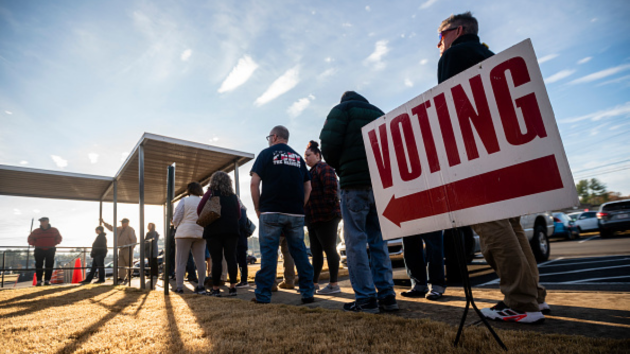
(ATLANTA) -- Early in-person voting kicks off in Georgia on Tuesday as uncertainty over new election rule changes looms large in one of the crucial states that will decide this year's presidential election.
Georgia counties will provide early in-person voting for at least 16 days, with some counties offering an extra voting day on Sunday. Nov. 1 will be the last day of early in-person voting.
The commencement of Georgia's three-week period for early voting comes as the Georgia state election board recently passed sweeping new changes to the state's election system, including how votes are tabulated.
Over the summer, the Republican-controlled State Election Board passed a rule requiring all ballots to be hand counted on election night, prompting legal challenges and pushback from both major parties as officials warned about potential delays in reporting results.
Georgia's Attorney General Chris Carr, a Republican, told the board it was operating outside of its authority, and warned that the rule changes were likely not lawful. Vice President Kamala Harris' campaign joined a lawsuit from Georgia Democrats suing to block the last-minute rule changes.
Fulton County Superior Court Judge Thomas A. Cox Jr. scheduled hearings this week to hear about the lawsuits challenging the new rules, including the hand-counting provision and new rules that expand access to poll watchers.
Another prominent Republican in the state, Secretary of State Brad Raffensperger, also promised that while Georgia law mandates certification on Nov. 12, he raised concerns about potential false claims that could arise as potential reporting delays linger.
"Everything we've been fighting for since 2020 has been to give the voter quicker, you know, responses, quicker results, and that's why we're going to post all the early votes by 8 p.m," Raffensperger said in an interview with the Washington Post on Monday.
"Well, this now drags on for the final 30 percent until one, two, three, or four o'clock in the morning." he said. "Really, that just becomes a breeding ground for conspiracy theories, and so we don't support it, but the judge will make that determination. We'll find out. We'll follow the law."
Georgia voters will already face changes this election cycle due to the state's Election Integrity Act, SB 202, passed in 2021, which adds more verification for voters requesting absentee ballots, limits the amount of ballot drop box locations, and, in one of the most controversial rule changes, the law now makes it a misdemeanor to give away food or water within 150 feet of a polling place or within 25 feet of a voter in line.
Advocates of the rule change argue that those rule changes will provide more transparency to the election process and have been set in place well before November's election so poll workers and voters have had time to understand the changes.
However, Democrats have repeatedly attempted to block provisions of the law, claiming that the strict rules on identification will disenfranchise voters and criminalize portions of the election process.
Candidates are educating their voters about the new voting landscape in Georgia, emphasizing how crucial turnout will be in the state.
Former President Bill Clinton spent time in middle Georgia on Sunday and Monday, focusing on mobilizing supporters in rural areas for Vice President Kamala Harris.
"They've been able to make it easier for states that agree with them to make it harder for people to vote, but not impossible, and Georgia has more experience than almost any other state in climbing those barriers and breaching them," he said at a campaign stop in Columbus on Monday.
Former President Donald Trump will mark the start of early voting in Georgia with a series of campaign stops on Tuesday. He will first tape a Fox News town hall focused on women's issues before delivering remarks at a rally in Atlanta.
The Harris campaign is deploying surrogates around the state on Tuesday and the vice president is expected to visit the state later this week as polling shows an extremely tight race in the Peach State -- which helped secure President Joe Biden's victory in 2020 after it narrowly flipped in favor of Democrats.
According to polling forecasts from 538, a victory in Georgia for either campaign would be pivotal to ensuring an electoral victory, which would give Trump around a 3-in-4 shot at winning the presidency and Harris about a 9-in-10 chance of becoming the next president.
That polling is reflective of how both campaigns have been prioritizing Georgia.
"If we lose Georgia, we lose the whole thing and our country goes to hell. Because we can't have her be president of the United States. She's grossly incompetent. We can't let that happen," Trump said during a rally in Atlanta in August.
Trump in recent weeks has publicly mended his relationship with Brian Kemp, the state's popular Republican governor, after furiously lashing out at him after Kemp refused to give in to Trump's demands in 2020 to prevent state officials from certifying the election.
Earlier this month, the two appeared together for the first time since 2020 when Trump toured the state after Hurricane Helene devastated parts of Georgia.
Harris has campaigned on the issue of abortion in Georgia, using the state's six-week abortion ban and Trump's role in overturning Roe vs. Wade to appeal to suburban women -- a key voter bloc.
"Now we know that at least two women, and those are only the stories we know here in the state of Georgia, died, died because of a Trump abortion ban," Harris said last month after a ProPublica report tied the deaths of two Georgia women to the state's restrictive ban.
"This is a health care crisis, and Donald Trump is the architect. He brags about overturning Roe v. Wade in his own words, quote, 'I did it, and I'm proud to have done it.' He is proud, proud that women are done."